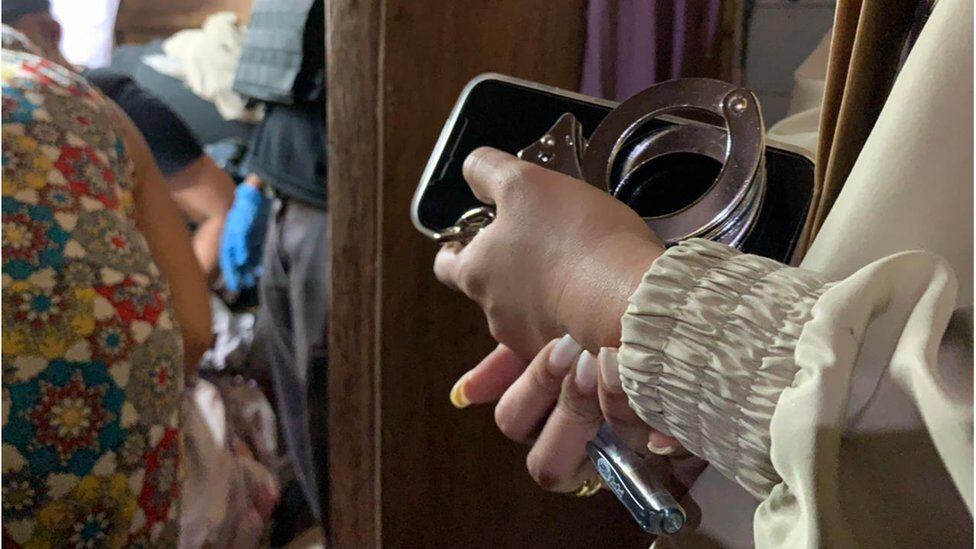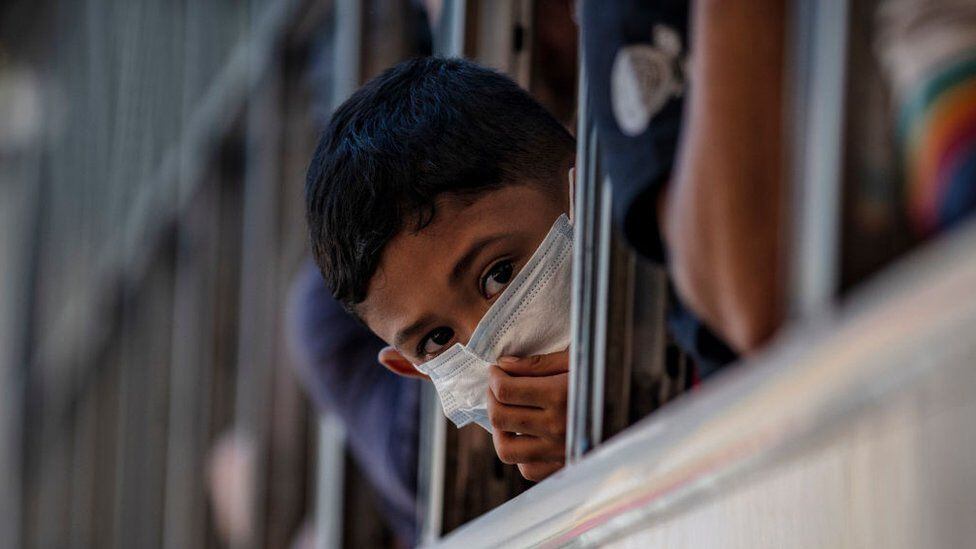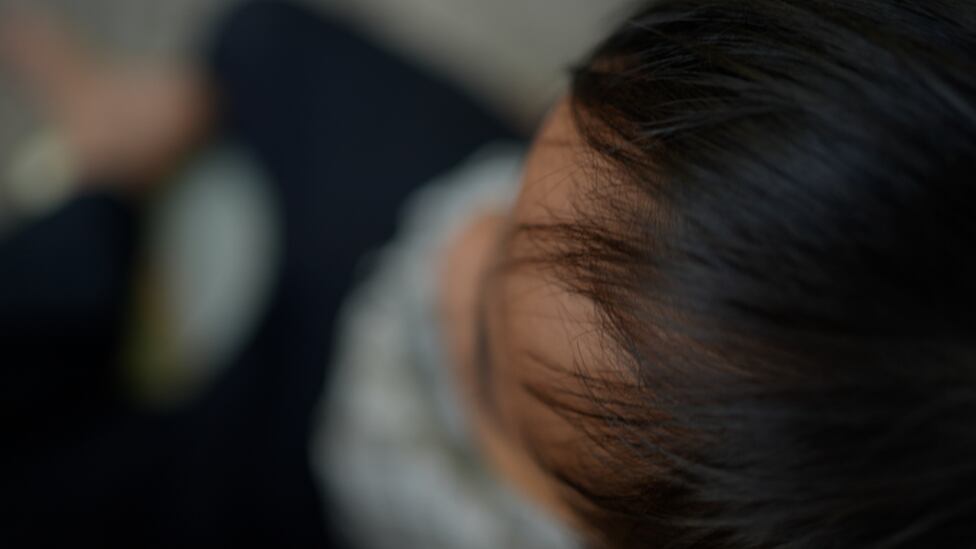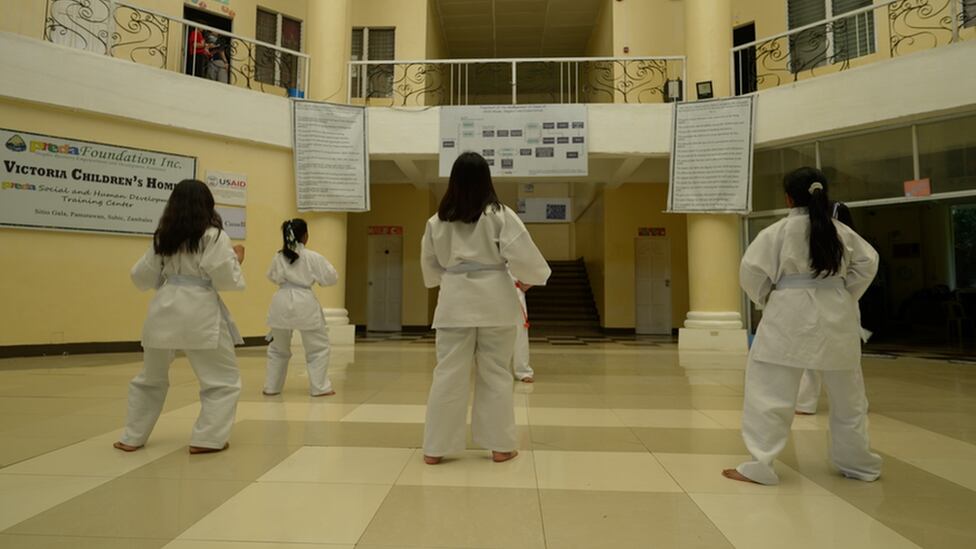Eric, 7, laughs a wide, toothless smile as he talks about space travel sitting in the shade of a garden, surrounded by thick, lush forest, a few hours north of the capital of PhilippinesManila.
Eric dreams of flying a rainbow colored rocket to Saturn. He just lost his milk teeth, but he is small for his age. His plaid white shirt hangs from his tiny shoulders.
“What makes you cry in therapy?” her social worker asks. “I cry because of my parents“He says looking at the ground.
Fedalyn Marie Baldo has spent months with Eric, his 10-year-old sister Maria, and two older brothers to help them understand that theirs is not a normal childhood.
For years, when their neighborhood was asleep and much of the Western world was awake, the four children they were forced to perform live sex shows for pedophiles from all over the world.
They were raped and repeatedly sexually abused for her mother before the camera. His father, aunt and uncle also participated.
It was the children’s father who finally reported his wife and family to the police, allegedly after a dispute.
Investigators traced payments to the family from accounts in the UK and Switzerland. Months later, Eric, his brothers, and his sister ended up in a home in the Preda charitywhich focuses on helping sexually abused children.
It is also where Baldo has worked for 17 years. At that time, the images and child sexual abuse videos have shot up to become a billion dollar industry in the Philippinescurrently the largest known source of exploitation of this type in the world.
Extreme poverty, high-speed internet access, and the ability to accept instructions in English encouraged this exploitation.
Then came the pandemic.
More than two years of lockdowns and one of the longest school closures in the world left vulnerable children stuck at home with parents without financial resources and desperate to make money.
A recent study by Unicef and Save the Children estimates that around one in five children Filipinos could be suffering from sexual exploitation, which equates to a grim figure of close to two million minors.
Baldo fears that abuse is “normalizing” in the Philippines and could become endemic in some of the poorest neighborhoods in the country.
The country’s president, Bongbong Marcos, has declared an “all-out war” against child sexual abuse and the industry it has stimulated.
But, so far, it is a war that the Philippines is not winning.
a global battle
In Manila, as dawn approaches, a team from the National Bureau of Investigation has gathered near a cemetery.
Flashlights are kept low, guns are loaded, cameras are set to film evidence as the team leader gives one last briefing.
They are under pressure to get results. Between the tombstones of this densely populated city a family lives among the dead.
A 36-year-old mother uses her smartphone in a small log cabin built against some of the larger monuments in the cemetery.
She thinks she’s sending a message to a client in australia requesting a live sex show that involves his three children. In reality, his text messages go to an undercover police officer.
As she turns on the camera, about a dozen agents rush through narrow paths toward her door. The only warning is when the stray dogs start barking.
She offers no resistance when an agent takes the children to safety and others begin bagging evidence: sex toys, smartphones, receipts detailing payments abroad.

As with many of these arrests, this is also the result of a notice from abroad.
The Australian Federal Police have told the BBC that a man was caught at an airport with a storage device full of explicit videos of child abuse.
His phone allegedly contained messages between him and a woman in the Philippines requesting money in exchange for the videos.
It then took dozens of agents weeks to plan the operation, which led to two arrests: one in Manila and the other in Sydney.
Australian officials said they recorded an increase of around 66% in child labor reports in the past year.
They are working together with teams from the International Justice Mission, the UK National Crime Agency and the Netherlands National Police, and officials in the Philippines, to try to find child sex offenders.
Once they identify them, they try to trace the source of the material.
But often, the only way abuse is reported is when the child reports it. And even then there is a long road ahead.
Several social workers say it takes days, even weeks, putting pressure on the police local police to rescue the children and press charges against the parents.
“Sometimes we get the cooperation of law enforcement, other times the actions of the people who are supposed to protect the children are delayed. But we have to fix it,” says Preda’s Emmanuel Drewery.

The organization first opened a children’s home for girls in the 1970s near the port city of Olongapo, once home to a large US naval base.
had become a hub for sex tourism: illegal prostitution between foreign men and Filipino girls, often still in their teens and trafficked to work in the industry, or young women driven into the sex trade by family pressure and economic desperation.
Years later, social workers fear that much of today’s sexual abuse is generational, that many of the mothers of the abused children have also been raped or sexually assaulted.
They think your point of view is: “It happened to me, I did this to survive and you should too”.
Father Shay Cullen, President of Preda, has been fighting for the rights of abused children in the Philippines since 1974. He wants a global solution to this new and growing problem.
“There must be [una] international law. This is the only way. All national governments should really put restrictions on internet corporations. They must cooperate to restrict the passage of child abuse material and transmission by streaming of child sexual abuse”.
He admits that things are changing, albeit slowly.
But that is only part of the war. For organizations like Preda, the biggest battle lies in the rehabilitation of children.
“Why did you do this?”
Some of the most difficult healing processes in Preda occur inside a dark room with soft music playing in the background.
There are large pads on the walls and floors, the kind gymnasts use for a soft landing. The only light comes from the open door.
About five children are kneeling, each in their own space. Most are facing the wall. The overwhelming sound is the thud of their fists and feet while hitting the pads.

The first raw, anguished screams make your heart stop. And then it starts up again, but it’s hard to keep listening, even from a distance, even for a few minutes.
The questions thrown against the padded walls -“Why did you do this? Why me? What did I do?“- are heartbreaking.
A therapist kneels quietly inside, ready to help. “It all starts in the bedroom,” says Francisco Bermido Jr, president of Preda.
‘If they can confront the abusers in the room’primal‘, they can move forward and confront these abusers in the courtroom. These are emotions like hate for their abusers, but also hate for those who were told but didn’t believe them.”
Preda has used this form of emotional release therapy, called primal (elementary), for decades to help children cope with the emotional impact of physical and sexual abuse.
But they’re fighting for lack of resources. Its center near Manila can only afford to house a few 100 children a year. But many more need help.
Once a police report is filed, children may be sent to various homes or orphanages, but many do not have the training or experience to care for children who have been abused.
Eric’s older brother was first placed in a nearby orphanage, without his siblings, before being transferred to the Preda site.
Social workers at the center say that about 40% of the abused children who have been in their care manage to lead lives safe from harm. And every success keeps them going.
routine helps. The center offers a daily homework program, sports like karate and volleyball, storytelling sessions and, of course, therapy.
“I love karate, the power dance and the primalEric yells as he happily thumps into the air.
He also likes to sing and joins his friends in the game room. When it’s her turn to solo, she sings softly at first, then her confidence grows and her voice carries through the room.

One of his older brothers is still too traumatized to speak. Her sister María, warns Baldo, also speaks little.
But that day, a beaming Maria, clutching her prized pencil case or stuffed toy, was surprisingly curious and full of questions. She really wanted to know what a snowflake felt like.
“When they arrived, they were very meek, docile and distrustful of the world and of others,” says Bermido Jr. But months later, can you tell your storyevery horrible detail, to the social workers.
The four children have also testified against their family, a requirement of Philippine courts.
“That’s really very important because that’s where your quest for justice begins“he adds.
Both Eric and Maria attend the group storytelling session. He sits next to her sister and absently winds her fingers around her ponytail.
Baldo asks Maria about Cinderella and she answers: “Cinderella didn’t give up even in difficult times or in the most complicated situations, she still had hope,” she says, hugging her stuffed toy tighter.
“Just like us, even though our parents abused us, we should be like Cinderella.”
Source: Elcomercio
I am Jack Morton and I work in 24 News Recorder. I mostly cover world news and I have also authored 24 news recorder. I find this work highly interesting and it allows me to keep up with current events happening around the world.

:quality(75)/cloudfront-us-east-1.images.arcpublishing.com/elcomercio/GIYTANJNGEZC2MBSKQYDAORSGE.png)


:quality(75)/cloudfront-us-east-1.images.arcpublishing.com/elcomercio/ZPRRVLFLKFAELKZ2AGPPODYZSY.jpg)


